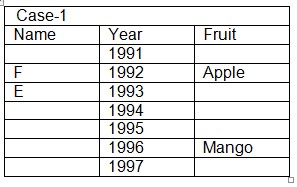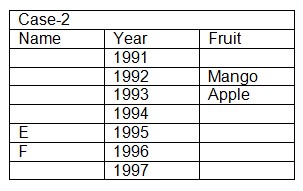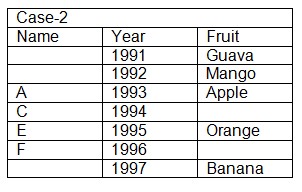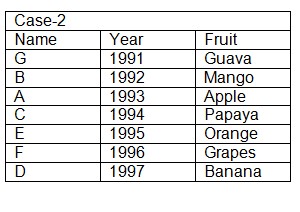Question
Who among the following person likes Papaya?
Study the following information carefully and answer the below questions. Seven person namely – A, B, C, D, E, F and G was born in different year from 1991 to 1997. All the calculations are done from current year 2019. Each person likes different fruits viz. Apple, Banana, Guava, Mango, Papaya, Grapes and Orange. All the information are not necessary in same order. Two person was born between the one who likes Mango and E. Three person was born between the one who likes Banana and A. Number of person elder to the one who likes Apple is half the number of person elder to E. F neither was born after the one who likes Banana nor likes Papaya. Number of person born before the one who likes Mango is same as number of person born after F. A neither likes Mango nor was born before the one who likes Guava. Two person was born between C and the one who likes Guava. At least two person was between the one who likes Papaya and G. C neither likes Banana nor was born after E. Number of persons born after the one who likes Mango is two more than number of persons born after C. D was born just after the one who likes Grapes.Solution
Number of person elder to the one who likes Apple is half the number of person elder to E. Two person was born between the one who likes Mango and E. That means, in case (1) the one who likes apple was born in 1992, in case (2) the one who likes Apple was born in 1993. Number of person born before the one who likes Mango is same as number of person born after F. F neither was born after the one who likes Banana nor likes Papaya. That means, in case (1) F was born in 1992, in case (2) F was born in 1996. Based on above given information we have: 
 Again, we have: Three person was born between the one who likes Banana and A. A neither likes Mango nor was born before the one who likes Guava. That means, in case (1) E likes Banana, in case (2) the one who likes Banana was born in 1997. C neither likes Banana nor was born after E. Two person was born between C and the one who likes Guava. That means, in case (1) C was born in 1991, in case (2) C was born in 1994. Number of persons born after the one who likes Mango is two more than number of persons born after C. That means, in case (2) E likes Orange, case (1) is not valid. Based on above given information we have:
Again, we have: Three person was born between the one who likes Banana and A. A neither likes Mango nor was born before the one who likes Guava. That means, in case (1) E likes Banana, in case (2) the one who likes Banana was born in 1997. C neither likes Banana nor was born after E. Two person was born between C and the one who likes Guava. That means, in case (1) C was born in 1991, in case (2) C was born in 1994. Number of persons born after the one who likes Mango is two more than number of persons born after C. That means, in case (2) E likes Orange, case (1) is not valid. Based on above given information we have:  Case (1) is not valid as the Number of persons born after the one who likes Mango is two more than number of persons born after C Again, we have: D was born just after the one who likes Grapes. That means, D was born in 1997. At least two person was between the one who likes Papaya and G. That means, G was born in 1991. Based on above given information we have final arrangement as follows:
Case (1) is not valid as the Number of persons born after the one who likes Mango is two more than number of persons born after C Again, we have: D was born just after the one who likes Grapes. That means, D was born in 1997. At least two person was between the one who likes Papaya and G. That means, G was born in 1991. Based on above given information we have final arrangement as follows: 
A and B are at present in the ratio 10:7. The ratio of A after 30 years to B 9 years ago equals 5:1. If C’s present age is 33⅓% less than (A+B) now,...
Present ages of 'A' and 'B' are in the ratio 9:4, respectively. Present age of 'C' is 175% more than 'B'. If the difference between present ages of 'C'...
- The age of Kiran 4 years ago was 10% more than the present age of Deepa. 4 years hence, the ratio of their ages will be 5:4. Find the difference between th...
Present ages of P and Q are in the ratio 3:5 respectively. If Q’s age, 16 years hence from now will be 6 times of P’s age, 6 years ago from now, the...
The ratio of present age of A to that of B is 4:3 and the ratio of present age of A to that of C is 4:5. The average present age of A, B and C is 24 yea...
The present ages of Tarun, Varun, and Arun are in the ratio 6:4:5. If Arun’s age after 6 years will be 36 years, find their current average age.
Five years ago, the average age of a family of four members was 25 years. Six years hence, the ratio of their ages will be 9:7:5:3. Find the a...
Sum of the present ages of A, B, C and D is 60 years. After 6 years ratio of their ages is 6:5:5:4. What is C’s present age?
The current combined age of Chris, Kane, and Root is 56 years. Root's current age is 20 years. The age ratio between Chris and Kane is 1:2. If Stokes, w...
The current ages of 'A' and 'B' are 'p' years and 'q' years respectively. Five years ago, their total age was 40 years. If the average of 'p' and 31 exc...
Relevant for Exams:


